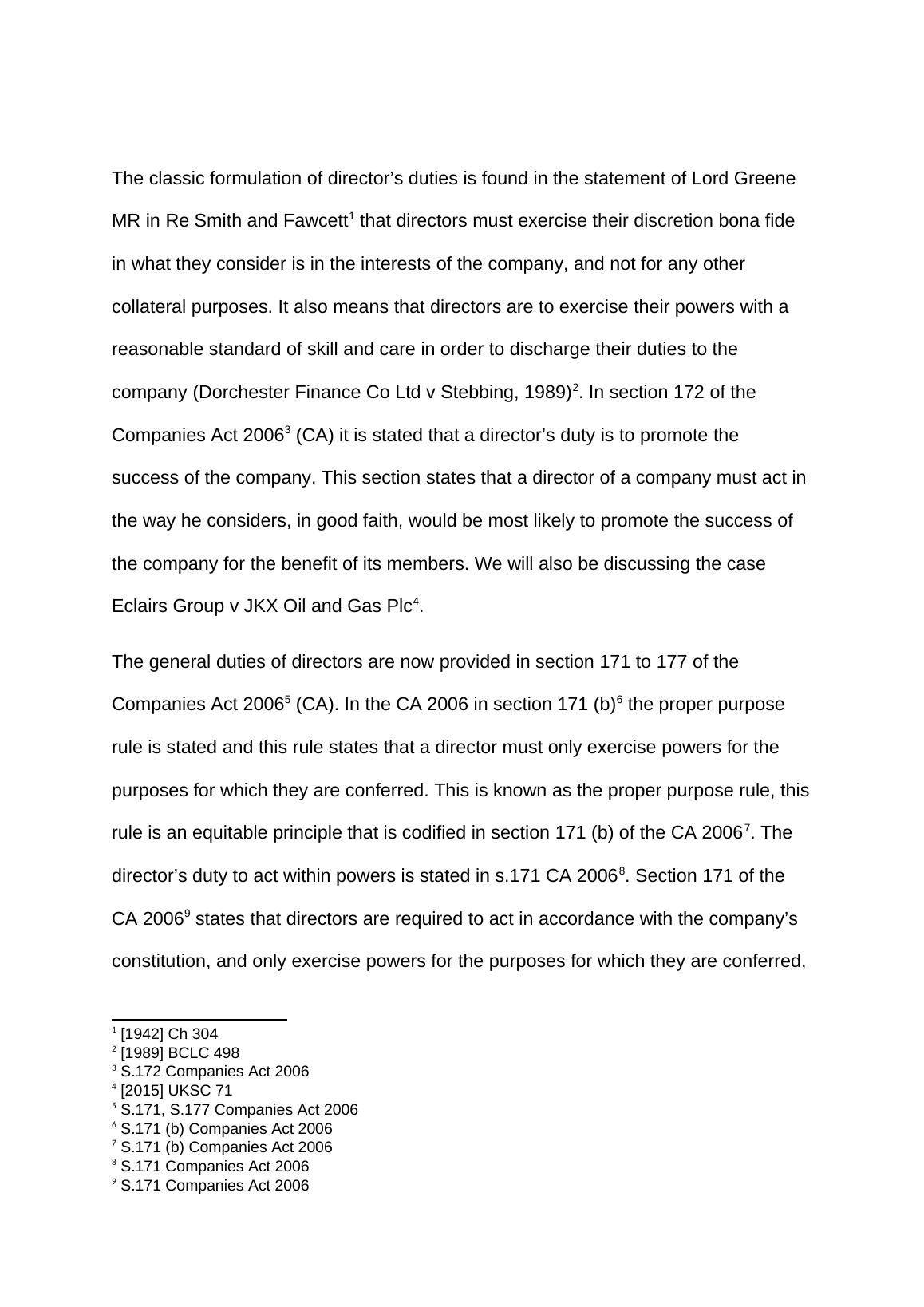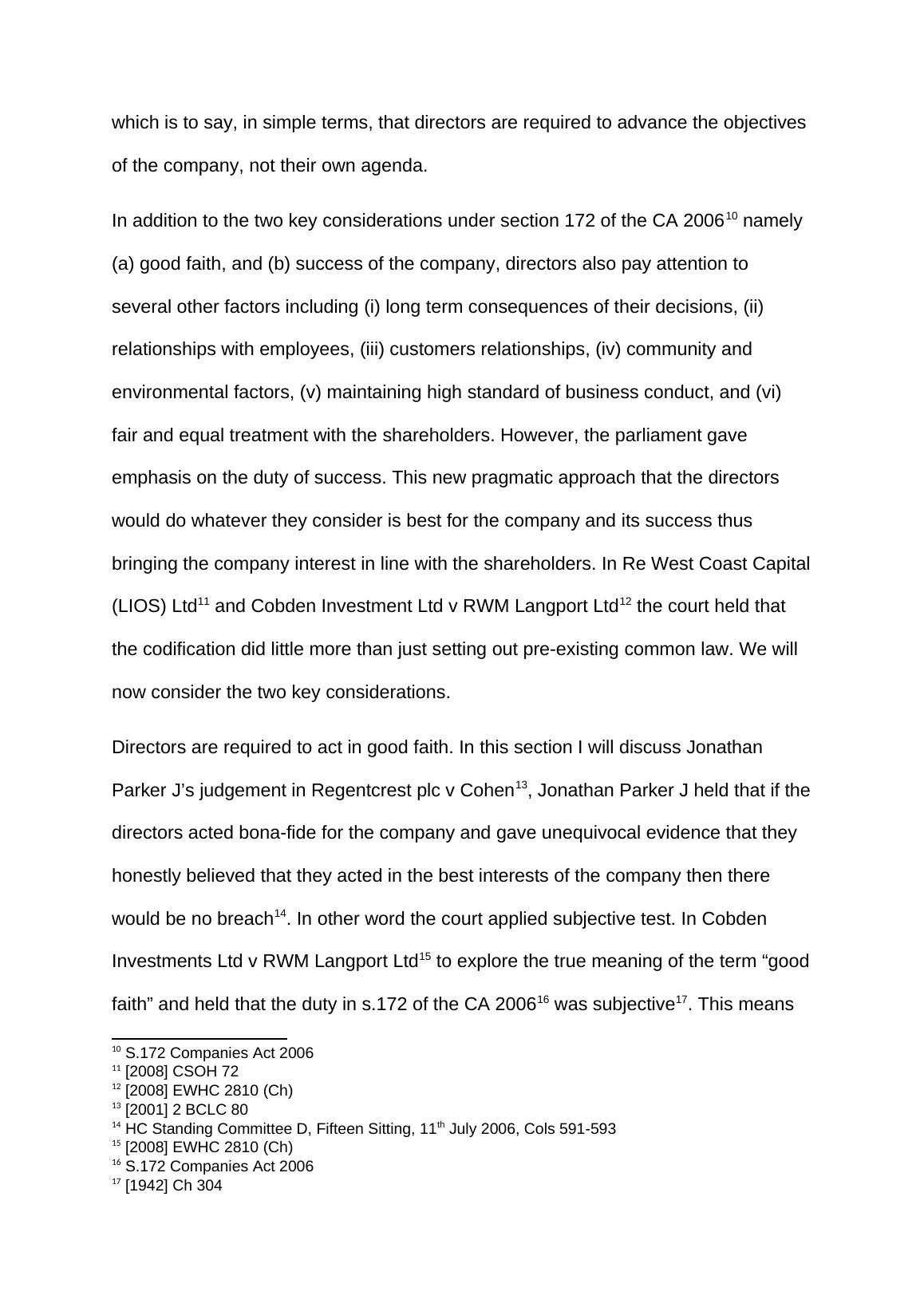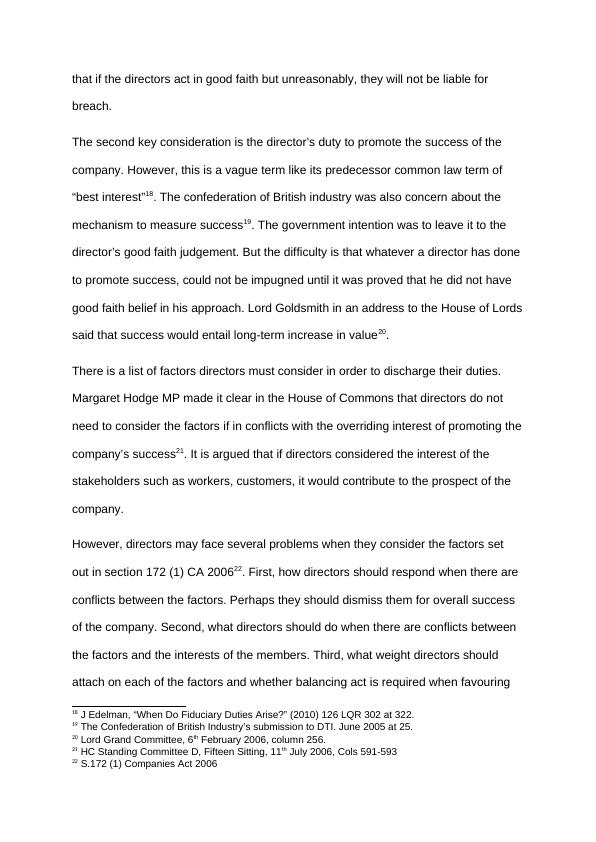The Duty to Promote the Success of the Company
8 Pages2401 Words158 Views
Added on 2021-05-26
The Duty to Promote the Success of the Company
Added on 2021-05-26
ShareRelated Documents
The classic formulation of director’s duties is found in the statement of Lord Greene MR in Re Smith and Fawcett1 that directors must exercise their discretion bona fide in what they consider is in the interests of the company, and not for any other collateral purposes. It also means that directors are to exercise their powers with a reasonable standard of skill and care in order to discharge their duties to the company (Dorchester Finance Co Ltd v Stebbing, 1989)2. In section 172 of the Companies Act 20063 (CA) it is stated that a director’s duty is to promote the success of the company. This section states that a director of a company must act inthe way he considers, in good faith, would be most likely to promote the success of the company for the benefit of its members. We will also be discussing the case Eclairs Group v JKX Oil and Gas Plc4. The general duties of directors are now provided in section 171 to 177 of the Companies Act 20065 (CA). In the CA 2006 in section 171 (b)6 the proper purpose rule is stated and this rule states that a director must only exercise powers for the purposes for which they are conferred. This is known as the proper purpose rule, thisrule is an equitable principle that is codified in section 171 (b) of the CA 20067. The director’s duty to act within powers is stated in s.171 CA 20068. Section 171 of the CA 20069 states that directors are required to act in accordance with the company’s constitution, and only exercise powers for the purposes for which they are conferred,1 [1942] Ch 304 2 [1989] BCLC 498 3 S.172 Companies Act 2006 4 [2015] UKSC 71 5 S.171, S.177 Companies Act 2006 6 S.171 (b) Companies Act 2006 7 S.171 (b) Companies Act 2006 8 S.171 Companies Act 2006 9 S.171 Companies Act 2006

which is to say, in simple terms, that directors are required to advance the objectivesof the company, not their own agenda. In addition to the two key considerations under section 172 of the CA 200610 namely (a) good faith, and (b) success of the company, directors also pay attention to several other factors including (i) long term consequences of their decisions, (ii) relationships with employees, (iii) customers relationships, (iv) community and environmental factors, (v) maintaining high standard of business conduct, and (vi) fair and equal treatment with the shareholders. However, the parliament gave emphasis on the duty of success. This new pragmatic approach that the directors would do whatever they consider is best for the company and its success thus bringing the company interest in line with the shareholders. In Re West Coast Capital(LIOS) Ltd11 and Cobden Investment Ltd v RWM Langport Ltd12 the court held that the codification did little more than just setting out pre-existing common law. We will now consider the two key considerations. Directors are required to act in good faith. In this section I will discuss Jonathan Parker J’s judgement in Regentcrest plc v Cohen13, Jonathan Parker J held that if thedirectors acted bona-fide for the company and gave unequivocal evidence that they honestly believed that they acted in the best interests of the company then there would be no breach14. In other word the court applied subjective test. In Cobden Investments Ltd v RWM Langport Ltd15 to explore the true meaning of the term “goodfaith” and held that the duty in s.172 of the CA 200616 was subjective17. This means 10 S.172 Companies Act 2006 11 [2008] CSOH 72 12 [2008] EWHC 2810 (Ch) 13 [2001] 2 BCLC 80 14 HC Standing Committee D, Fifteen Sitting, 11th July 2006, Cols 591-593 15 [2008] EWHC 2810 (Ch) 16 S.172 Companies Act 2006 17 [1942] Ch 304

that if the directors act in good faith but unreasonably, they will not be liable for breach. The second key consideration is the director’s duty to promote the success of the company. However, this is a vague term like its predecessor common law term of “best interest”18. The confederation of British industry was also concern about the mechanism to measure success19. The government intention was to leave it to the director’s good faith judgement. But the difficulty is that whatever a director has doneto promote success, could not be impugned until it was proved that he did not have good faith belief in his approach. Lord Goldsmith in an address to the House of Lordssaid that success would entail long-term increase in value20. There is a list of factors directors must consider in order to discharge their duties. Margaret Hodge MP made it clear in the House of Commons that directors do not need to consider the factors if in conflicts with the overriding interest of promoting thecompany’s success21. It is argued that if directors considered the interest of the stakeholders such as workers, customers, it would contribute to the prospect of the company. However, directors may face several problems when they consider the factors set out in section 172 (1) CA 200622. First, how directors should respond when there are conflicts between the factors. Perhaps they should dismiss them for overall success of the company. Second, what directors should do when there are conflicts between the factors and the interests of the members. Third, what weight directors should attach on each of the factors and whether balancing act is required when favouring 18 J Edelman, “When Do Fiduciary Duties Arise?” (2010) 126 LQR 302 at 322. 19 The Confederation of British Industry’s submission to DTI. June 2005 at 25. 20 Lord Grand Committee, 6th February 2006, column 256. 21 HC Standing Committee D, Fifteen Sitting, 11th July 2006, Cols 591-593 22 S.172 (1) Companies Act 2006

End of preview
Want to access all the pages? Upload your documents or become a member.
Related Documents
Directors' Duties and Obligations in a Company: A Case Studylg...
|19
|4019
|336
Directors' Duties: Should Australia Adopt UK's Section 172 of Companies Act 2006?lg...
|9
|2723
|73
Business Law: Directors' Duties and Limited Liabilitylg...
|15
|3792
|282
Assignment on Commercial Law PDFlg...
|9
|1988
|106
Directors' Duties under Section 181 of the Corporations Actlg...
|9
|2461
|338
Legal Aspects of Businesslg...
|6
|1389
|25
